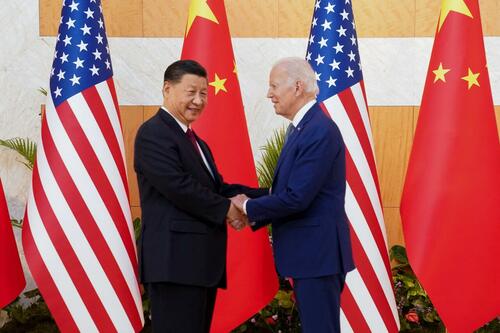
Update(1052ET): During President Biden's Q&A portion of his post Xi meeting presser, he took just a few questions, during which time he stressed that he and the Chinese president understood each other well. "There need not be a new Cold War...We were candid and clear with one another across the board."
Addressing the key geopolitical flashpoint between the rival nuclear-armed superpowers, Biden said he doesn't believe that China will invade Taiwan:
"I do not think there's any imminent attempt of China to invade Taiwan. We want cross-strait issues to be resolved," he said.
He called the meeting "direct and straightforward" - while saying that on Taiwan and "every issue that was raised" they will maintain open lines of communication. He confirmed that Secretary of State Blinken will later visit China as a follow-up to Monday's G20 summit discussions.
As for the official readout from the Chinse said, it too stressed that "differences" between the two countries should not become an obstacle to cooperation on key fronts. "It is in our mutual and fundamental interest to prevent conflict and confrontation and achieve peaceful coexistence. The two economies are deeply integrated, and both face new tasks in development," Xi said. He said the world is big enough for the two to develop and prosper.
As for the Taiwan question, Xi stressed that this is "the bedrock of the political foundation of China-US relations, and the first red line that must not be crossed in China-US relations."
Pres. Biden says he found China’s Xi Jinping “to be what he's always been—direct and straightforward.”
— ABC News Politics (@ABCPolitics) November 14, 2022
“We were very blunt with one another about places where we disagreed or where we were uncertain of each other's position.” https://t.co/ohZsiGmQZv pic.twitter.com/nmxqFMhJz5
Further, the readout via China's Foreign Ministry stated, "Their financial teams will continue dialogue and coordination on macroeconomic policies, economic ties and trade They agreed to make good use of the China-US joint working group to promote the resolution of more issues Both sides agreed that cultural exchange is very important and encourage to enlarge the personnel exchanges in all areas."
Bloomberg noted Chinese stocks listed in the US extend their gains in premarket trading upon the conclusion of the three-and-a-half hour meeting.
* * *
The high-stakes G20 Bali meeting between President Biden and Chinese leader Xi has concluded after three hours on Monday, having begun at 4:41am ET/5:41pm local time. Two cabinet-level officials were included seated on Biden's side - Secretary of State Antony Blinken and Secretary of the Treasury Janet Yellen, with the former official having previously called China the "most serious long-term challenge to the international order." Also at the table was national security adviser Jake Sullivan.
In opening remarks going into the meeting President Xi Jinping had said, "Currently the China-US relationship is in such a situation that we all care a lot about it, because this is not the fundamental interest of our two countries and peoples, and it is not what the international community expects (from) us."
"As leaders of the two major countries we need to chart the right course for the US-China relationship," Xi added. "In this time and age great changes are unfolding in ways like never before, humanity is confronted with unprecedented challenges, the world has come to a crossroads."

"Where to go from here is a question that is not only on our minds, but also on the minds of all countries." the Chinese leader stressed.
The White House has signaled there are no plans to make fundamental concessions to Xi, nor are there any expected major breakthroughs, also as the war on Ukraine overshadows the Group of 20 summit. Here's how the meeting started as the two leaders entered the room:
"Good to see you," Biden said to Xi before they joined US and Chinese officials. The two sides sat at long conference tables with a display of flowers between them.
"We share a responsibility, in my view, to show China and the United States can manage our differences, prevent competition from coming anywhere near conflict, and find ways to work better together," Biden said to kick off the talks.
As for Xi, he agreed on the "need to find the right direction" and "elevate the relationship." Among the chief foreign policy issues discussed were Ukraine, Taiwan, and North Korea. All eyes have been on China's continued resistance to Western pressure on Ukraine, given Beijing has never once condemned the invasion, while at the same time has called for negotiations and the avoidance of escalation.
Hear what Biden and Xi said to each other in first meeting as heads of state. https://t.co/731iGGOvSx pic.twitter.com/weHKmzWEdd
— CNN (@CNN) November 14, 2022
On trade and the economy, CNN reported, "Speaking with reporters in Bali, US Treasury Secretary Janet Yellen said the meeting was intended to stabilize the relationship and expressed hopes that it would lay the groundwork for bilateral economic engagement."
China's Foreign Ministry immediately following the meeting described the lengthy meeting as including a "candid and in-depth exchange of views."
The White House readout issued within an hour of the meeting concluding said that Biden stressed readiness to "compete vigorously with the PRC, including by investing in sources of strength at home and aligning efforts with allies and partners around the world," however reiterated that this "competition should not veer into conflict and underscored that the United States and China must manage the competition responsibly and maintain open lines of communication."
And more, the per the White House:
President Biden underscored that the United States and China must work together to address transnational challenges – such as climate change, global macroeconomic stability including debt relief, health security, and global food security – because that is what the international community expects. The two leaders agreed to empower key senior officials to maintain communication and deepen constructive efforts on these and other issues. They welcomed ongoing efforts to address specific issues in U.S.-China bilateral relations, and encouraged further progress in these existing mechanisms, including through joint working groups. They also noted the importance of ties between the people of the United States and the PRC.
On China's human rights record and the Taiwan issue, President Biden said the following:
President Biden raised concerns about PRC practices in Xinjiang, Tibet, and Hong Kong, and human rights more broadly. On Taiwan, he laid out in detail that our one China policy has not changed, the United States opposes any unilateral changes to the status quo by either side, and the world has an interest in the maintenance of peace and stability in the Taiwan Strait. He raised U.S. objections to the PRC’s coercive and increasingly aggressive actions toward Taiwan, which undermine peace and stability across the Taiwan Strait and in the broader region, and jeopardize global prosperity. President Biden also raised ongoing concerns about China’s non-market economic practices, which harm American workers and families, and workers and families around the world.
Concerning the most anticipated hot button issue, Russia's ongoing military offensive in Ukraine:
President Biden raised Russia’s brutal war against Ukraine and Russia’s irresponsible threats of nuclear use. President Biden and President Xi reiterated their agreement that a nuclear war should never be fought and can never be won and underscored their opposition to the use or threat of use of nuclear weapons in Ukraine. President Biden also raised concerns about the DPRK’s provocative behavior, noted all members of the international community have an interest in encouraging the DPRK to act responsibly, and underscored the United States’ ironclad commitment to defending our Indo-Pacific Allies.
Thus the two sides reiterated their agreement that the Ukraine crisis should never reach the point of spiraling toward nuclear rhetoric or war.
Xi tells Biden that China and the United States should take history as a mirror - state media https://t.co/H8U5z20Moo pic.twitter.com/6NSSjXmRhP
— Reuters (@Reuters) November 14, 2022
From the Chinese side, the first statement at the conclusion of the meeting issued via Xinhua said "China and the United States should take history as a mirror and let it guide the future."
* * *
Below are headlines previewing the issues of contention and that were under discussion via Newsquawk:
- US President Biden says US and China can manage differences and stop competition from turning into conflict, expects US and China to play a role in address climate and food shortages.
- Chinese President Xi says has stayed in touch with US President Biden via video but it is no replacement for in-person meetings, both nations need to chart their course and find the right direction for the relationship and elevate it. Prepared to have a candid and in-depth exchange of views on the US-China relationship.
- The White House said further engagement after the Biden-Xi meeting could include face-to-face meetings, according to Reuters.
- Stated prior to the meeting US President Biden will make it clear in the meeting with Chinese President Xi that the US does not seek competition or conflict, and the meeting could last "a couple of hours", according to Reuters citing the White House National Security Adviser Sullivan.
- Stated prior to the meeting US President Biden underscored that freedom of navigation and overflight must be respected in the East China Sea and the South China Sea, via Reuters.
- US President Biden will raise the issue of North Korea with Chinese President Xi at the G20 Summit, according to the White House. Biden will tell Xi that if North Korea continues, there will be more enhanced US military presence in the region. Blackrock (BLK) has shelved its China bond ETF amid growing tensions between the US and China alongside a reversal in the China-US yield differential, according to FT.
- US Treasury Secretary Yellen will ask for clarity on China's plans to ease COVID restrictions alongside issues in the Chinese property market, in a meeting with the PBoC Governor, according to Treasury officials cited by Reuters.
- US Treasury Secretary Yellen said the US will likely discuss export controls with Chinese officials, according to Bloomberg.
The White House has confirmed that Biden and Xi agreed Secretary of State Blinken will later visit China as a follow-up to Monday's G20 summit discussions.
Update(1052ET): During President Biden’s Q&A portion of his post Xi meeting presser, he took just a few questions, during which time he stressed that he and the Chinese president understood each other well. “There need not be a new Cold War…We were candid and clear with one another across the board.”
Addressing the key geopolitical flashpoint between the rival nuclear-armed superpowers, Biden said he doesn’t believe that China will invade Taiwan:
“I do not think there’s any imminent attempt of China to invade Taiwan. We want cross-strait issues to be resolved,” he said.
He called the meeting “direct and straightforward” – while saying that on Taiwan and “every issue that was raised” they will maintain open lines of communication. He confirmed that Secretary of State Blinken will later visit China as a follow-up to Monday’s G20 summit discussions.
As for the official readout from the Chinse said, it too stressed that “differences” between the two countries should not become an obstacle to cooperation on key fronts. “It is in our mutual and fundamental interest to prevent conflict and confrontation and achieve peaceful coexistence. The two economies are deeply integrated, and both face new tasks in development,” Xi said. He said the world is big enough for the two to develop and prosper.
As for the Taiwan question, Xi stressed that this is “the bedrock of the political foundation of China-US relations, and the first red line that must not be crossed in China-US relations.”
Pres. Biden says he found China’s Xi Jinping “to be what he’s always been—direct and straightforward.”
“We were very blunt with one another about places where we disagreed or where we were uncertain of each other’s position.” https://t.co/ohZsiGmQZv pic.twitter.com/nmxqFMhJz5
— ABC News Politics (@ABCPolitics) November 14, 2022
Further, the readout via China’s Foreign Ministry stated, “Their financial teams will continue dialogue and coordination on macroeconomic policies, economic ties and trade They agreed to make good use of the China-US joint working group to promote the resolution of more issues Both sides agreed that cultural exchange is very important and encourage to enlarge the personnel exchanges in all areas.”
Bloomberg noted Chinese stocks listed in the US extend their gains in premarket trading upon the conclusion of the three-and-a-half hour meeting.
* * *
The high-stakes G20 Bali meeting between President Biden and Chinese leader Xi has concluded after three hours on Monday, having begun at 4:41am ET/5:41pm local time. Two cabinet-level officials were included seated on Biden’s side – Secretary of State Antony Blinken and Secretary of the Treasury Janet Yellen, with the former official having previously called China the “most serious long-term challenge to the international order.” Also at the table was national security adviser Jake Sullivan.
[embedded content]
In opening remarks going into the meeting President Xi Jinping had said, “Currently the China-US relationship is in such a situation that we all care a lot about it, because this is not the fundamental interest of our two countries and peoples, and it is not what the international community expects (from) us.”
“As leaders of the two major countries we need to chart the right course for the US-China relationship,” Xi added. “In this time and age great changes are unfolding in ways like never before, humanity is confronted with unprecedented challenges, the world has come to a crossroads.”

“Where to go from here is a question that is not only on our minds, but also on the minds of all countries.” the Chinese leader stressed.
The White House has signaled there are no plans to make fundamental concessions to Xi, nor are there any expected major breakthroughs, also as the war on Ukraine overshadows the Group of 20 summit. Here’s how the meeting started as the two leaders entered the room:
“Good to see you,” Biden said to Xi before they joined US and Chinese officials. The two sides sat at long conference tables with a display of flowers between them.
“We share a responsibility, in my view, to show China and the United States can manage our differences, prevent competition from coming anywhere near conflict, and find ways to work better together,” Biden said to kick off the talks.
As for Xi, he agreed on the “need to find the right direction” and “elevate the relationship.” Among the chief foreign policy issues discussed were Ukraine, Taiwan, and North Korea. All eyes have been on China’s continued resistance to Western pressure on Ukraine, given Beijing has never once condemned the invasion, while at the same time has called for negotiations and the avoidance of escalation.
Hear what Biden and Xi said to each other in first meeting as heads of state. https://t.co/731iGGOvSx pic.twitter.com/weHKmzWEdd
— CNN (@CNN) November 14, 2022
On trade and the economy, CNN reported, “Speaking with reporters in Bali, US Treasury Secretary Janet Yellen said the meeting was intended to stabilize the relationship and expressed hopes that it would lay the groundwork for bilateral economic engagement.”
China’s Foreign Ministry immediately following the meeting described the lengthy meeting as including a “candid and in-depth exchange of views.”
The White House readout issued within an hour of the meeting concluding said that Biden stressed readiness to “compete vigorously with the PRC, including by investing in sources of strength at home and aligning efforts with allies and partners around the world,” however reiterated that this “competition should not veer into conflict and underscored that the United States and China must manage the competition responsibly and maintain open lines of communication.”
And more, the per the White House:
President Biden underscored that the United States and China must work together to address transnational challenges – such as climate change, global macroeconomic stability including debt relief, health security, and global food security – because that is what the international community expects. The two leaders agreed to empower key senior officials to maintain communication and deepen constructive efforts on these and other issues. They welcomed ongoing efforts to address specific issues in U.S.-China bilateral relations, and encouraged further progress in these existing mechanisms, including through joint working groups. They also noted the importance of ties between the people of the United States and the PRC.
On China’s human rights record and the Taiwan issue, President Biden said the following:
President Biden raised concerns about PRC practices in Xinjiang, Tibet, and Hong Kong, and human rights more broadly. On Taiwan, he laid out in detail that our one China policy has not changed, the United States opposes any unilateral changes to the status quo by either side, and the world has an interest in the maintenance of peace and stability in the Taiwan Strait. He raised U.S. objections to the PRC’s coercive and increasingly aggressive actions toward Taiwan, which undermine peace and stability across the Taiwan Strait and in the broader region, and jeopardize global prosperity. President Biden also raised ongoing concerns about China’s non-market economic practices, which harm American workers and families, and workers and families around the world.
Concerning the most anticipated hot button issue, Russia’s ongoing military offensive in Ukraine:
President Biden raised Russia’s brutal war against Ukraine and Russia’s irresponsible threats of nuclear use. President Biden and President Xi reiterated their agreement that a nuclear war should never be fought and can never be won and underscored their opposition to the use or threat of use of nuclear weapons in Ukraine. President Biden also raised concerns about the DPRK’s provocative behavior, noted all members of the international community have an interest in encouraging the DPRK to act responsibly, and underscored the United States’ ironclad commitment to defending our Indo-Pacific Allies.
Thus the two sides reiterated their agreement that the Ukraine crisis should never reach the point of spiraling toward nuclear rhetoric or war.
Xi tells Biden that China and the United States should take history as a mirror – state media https://t.co/H8U5z20Moo pic.twitter.com/6NSSjXmRhP
— Reuters (@Reuters) November 14, 2022
From the Chinese side, the first statement at the conclusion of the meeting issued via Xinhua said “China and the United States should take history as a mirror and let it guide the future.”
* * *
Below are headlines previewing the issues of contention and that were under discussion via Newsquawk:
- US President Biden says US and China can manage differences and stop competition from turning into conflict, expects US and China to play a role in address climate and food shortages.
- Chinese President Xi says has stayed in touch with US President Biden via video but it is no replacement for in-person meetings, both nations need to chart their course and find the right direction for the relationship and elevate it. Prepared to have a candid and in-depth exchange of views on the US-China relationship.
- The White House said further engagement after the Biden-Xi meeting could include face-to-face meetings, according to Reuters.
- Stated prior to the meeting US President Biden will make it clear in the meeting with Chinese President Xi that the US does not seek competition or conflict, and the meeting could last “a couple of hours”, according to Reuters citing the White House National Security Adviser Sullivan.
- Stated prior to the meeting US President Biden underscored that freedom of navigation and overflight must be respected in the East China Sea and the South China Sea, via Reuters.
- US President Biden will raise the issue of North Korea with Chinese President Xi at the G20 Summit, according to the White House. Biden will tell Xi that if North Korea continues, there will be more enhanced US military presence in the region. Blackrock (BLK) has shelved its China bond ETF amid growing tensions between the US and China alongside a reversal in the China-US yield differential, according to FT.
- US Treasury Secretary Yellen will ask for clarity on China’s plans to ease COVID restrictions alongside issues in the Chinese property market, in a meeting with the PBoC Governor, according to Treasury officials cited by Reuters.
- US Treasury Secretary Yellen said the US will likely discuss export controls with Chinese officials, according to Bloomberg.
The White House has confirmed that Biden and Xi agreed Secretary of State Blinken will later visit China as a follow-up to Monday’s G20 summit discussions.







